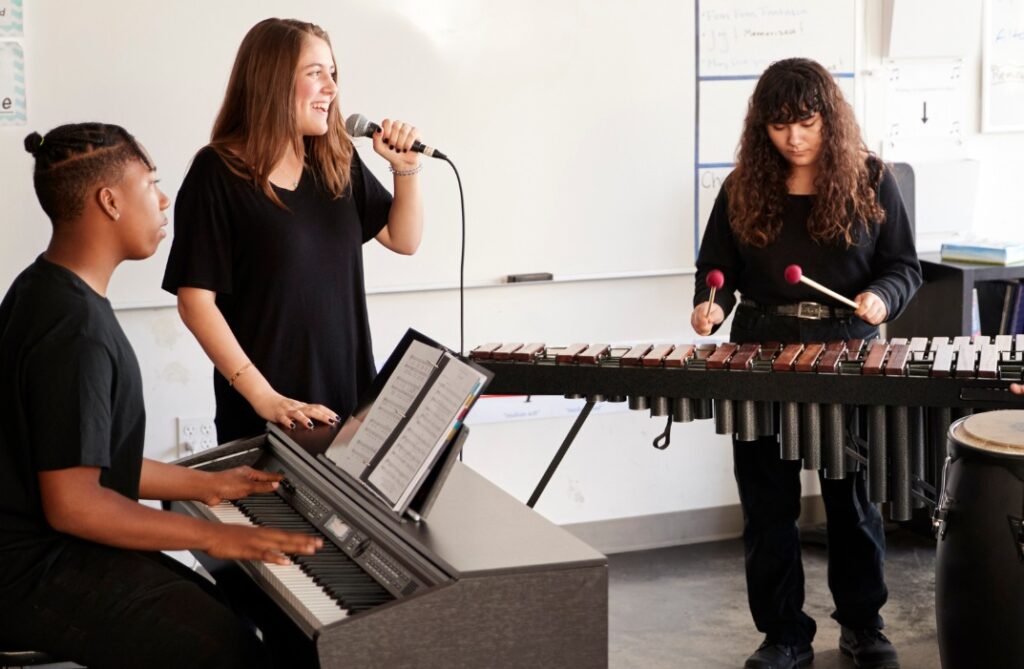Amid looming economic uncertainty and fears of recession, the governor has proposed cutting $1.2 billion of one-time discretionary funding for arts and instructional materials in his pared-back 2023-24 state budget, which responds to a projected $22.5 billion budget shortfall. However, the loss of that block grant money can be largely offset with the nearly $1 billion earmarked for arts education through Proposition 28, many arts advocates say, softening the blow.
A game-changing piece of arts education legislation, Proposition 28, passed last fall, sets aside money in the state’s general fund to give school districts additional funding — about 1% of the total state and federal money they receive under the Local Control Funding Formula — for arts education. For districts with at least 500 students, the initiative requires that 80% of the funds go to hiring teachers and 20% to training and supplies, such as musical instruments.
“We see this as a long game, and Proposition 28 is ongoing funding, not a one-time grant. That’s the most important thing for us,” said Tom DeCaigny, executive director of Create CA, an arts advocacy group.
“It’s a historic moment for anybody who is excited about creativity and public education.”
The impact of cutting the block grants is also blunted because the funds were entirely discretionary, which means that despite having “arts and music” in the name, they were actually designed to be used for a variety of needs, including health care and pension administration. That’s why many suggest the effect on student-focused arts education may be minimal.
“We were frustrated that this funding was designed to be completely discretionary,” said Adonai Mack, senior director of education at Children Now, a research and advocacy organization focused on children’s welfare in California, “meaning that this block of funding was never meant to be strictly for arts, music, instructional materials.”

However, others point out that some momentum may be lost at a time when districts are already scrambling with crippling staff shortages, dire learning gaps, and pressing student well-being issues.
“It’s still disruptive for many districts, given that they are pretty far along in their budget planning cycle for the next year,” said Troy Flint, spokesman for the California School Boards Association.
“They will have funded a number of critical programs and services using this block grant, so they’ll have to go back to the drawing board now.”
The proposed cutbacks come even as many are championing arts education as a way to help students bounce back from the stresses of the pandemic. That need remains keen, arts advocates say, but many are optimistic that Proposition 28 will fit the bill.
“The passage of Prop. 28 proves that providing access to arts education is a priority for California voters,” said Julie Baker, executive director of California Arts Advocates. “We recognize that the budget picture has changed this year, but the needs for youth to heal and grow from the impacts of the pandemic and other traumas have not, and so we strongly encourage the budget to include ongoing investments in access to arts and culture programs for all Californians.”
Once considered a cornerstone of any comprehensive education, the arts have long been scrubbed in California classrooms in favor of math and science. But the pandemic exposed the urgent need to help children cope with trauma and find ways to heal, experts say, amid what many see an escalating youth mental health crisis.
“The pandemic has taught us a lot about all the things the arts offer in terms of social-emotional well-being and student mental health,” said DeCaigny. “If the pandemic taught us anything, it’s that there needs to be some joy in our lives, and we’ve always known that the arts provide that.”
Arts advocates also point to the power of the arts to boost student achievement. Despite the fact that students with access to the arts are five times less likely to drop out of school and four times more likely to receive a bachelor’s degree, nine out of 10 California schools, research shows, fail to meet the state mandate to provide arts education in schools. This is an equity issue, experts say, because it’s generally only affluent students who receive ongoing exposure to the arts.
Building student engagement may also be crucial to combating learning loss, many suggest, as students struggle to rebound from the academic setbacks triggered by the pandemic.
“Providing exposure to the visual, digital and performing arts is sometimes the key that keeps children engaged in the classroom and focused on learning,” said Mack. “In the hands of highly qualified and innovative educators, they can use arts to convey a variety of curriculum content. I have personally seen this utilized in both my children’s and grandchildren’s classrooms that have them excited about what they have learned and looking forward to coming back the next day.”
Many arts advocates view the overwhelming public support for Proposition 28, which passed in November with 64% voter approval in a highly polarized election, as a sign that most Californians appreciate the power of the arts to spark learning.
“There’s nothing like it in the country as far as we know,” said DeCaigny. “We’re thrilled about it. We could never have imagined such a significant win for arts education.”
The initiative also had the backing of California’s prominent entertainment industry, with celebrity supporters including Dr. Dre, Quincy Jones, Katy Perry and a slew of other performers. It should also be noted that the state’s arts and entertainment industry represents a $300 billion sector with more than 2.6 million jobs.
